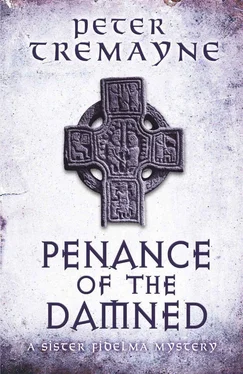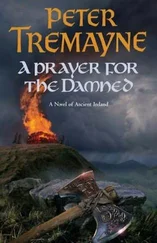Peter Tremayne - Penance of the Damned
Здесь есть возможность читать онлайн «Peter Tremayne - Penance of the Damned» весь текст электронной книги совершенно бесплатно (целиком полную версию без сокращений). В некоторых случаях можно слушать аудио, скачать через торрент в формате fb2 и присутствует краткое содержание. Год выпуска: 2016, Издательство: Headline, Жанр: Исторический детектив, на английском языке. Описание произведения, (предисловие) а так же отзывы посетителей доступны на портале библиотеки ЛибКат.
- Название:Penance of the Damned
- Автор:
- Издательство:Headline
- Жанр:
- Год:2016
- ISBN:нет данных
- Рейтинг книги:5 / 5. Голосов: 1
-
Избранное:Добавить в избранное
- Отзывы:
-
Ваша оценка:
- 100
- 1
- 2
- 3
- 4
- 5
Penance of the Damned: краткое содержание, описание и аннотация
Предлагаем к чтению аннотацию, описание, краткое содержание или предисловие (зависит от того, что написал сам автор книги «Penance of the Damned»). Если вы не нашли необходимую информацию о книге — напишите в комментариях, мы постараемся отыскать её.
Penance of the Damned — читать онлайн бесплатно полную книгу (весь текст) целиком
Ниже представлен текст книги, разбитый по страницам. Система сохранения места последней прочитанной страницы, позволяет с удобством читать онлайн бесплатно книгу «Penance of the Damned», без необходимости каждый раз заново искать на чём Вы остановились. Поставьте закладку, и сможете в любой момент перейти на страницу, на которой закончили чтение.
Интервал:
Закладка:
‘Questions that are irrelevant,’ Abbot Nannid returned sourly. ‘We have heard that Brehon Faolchair, Prince Donennach’s own judge, has investigated and heard all the evidence. This man Gorman remains guilty of having killed Abbot Segdae of Imleach. There is now just one question left: does Fidelma of Cashel claim that Brehon Faolchair has made a mistake in his judgement?’
‘Fidelma of Cashel,’ she replied coolly, ‘concedes that Brehon Faolchair has made an investigation and has, on the given evidence, formed the opinion that Gorman was responsible for the death of the abbot.’
‘Hah!’ ejaculated Abbot Nannid. ‘We have already reached a verdict. The man is guilty and the only reason we are here now is to discuss the punishment.’
‘A punishment which is clear in the laws of the Fenechus, the laws passed down by the Brehons, the judges of our people,’ said Prior Cuan. ‘Our law allows for someone guilty of murder to atone for their crime by payment of prescribed compensation and a fine. That has been our law since the time before time.’
‘The time beyond time when we were savages; pagans and not bathed in the light of the New Faith!’ Abbot Nannid countered. There was a muttered agreement from his steward. ‘Are we now not all of the one Faith and should we not obey the one law – the law of God?’
‘It seems that we may have one Faith but already there are many interpretations of it,’ replied Cuan.
Abbot Nannid rose dramatically from his seat. ‘There is only one interpretation. The law of the New Faith is clear in the words of the ancient scriptures: non misereberis eius sed animam pro anima …’
‘Show no pity for the guilty!’ translated Prior Cuan, continuing to recite the scripture. ‘The rule should be life for life, eye for eye, tooth for tooth, hand for hand, foot for foot.’
Abbot Nannid sat down, smiling triumphantly. ‘Therefore you know the law of the Faith as well as I do. Abbot Segdae was of the Faith. So we of the Faith demand that the man who killed him should also be killed in accordance with the law of the Faith.’
All eyes now turned to Fidelma rather than to Prior Cuan.
She herself looked to Brehon Faolchair. ‘Is this demand from Abbot Nannid deemed worthy of a response?’ she asked coldly.
Abbot Nannid flushed and was about to make some angry retort when Prince Donennach held up his hand to still him.
‘I am afraid it is, lady. The purpose of this gathering before our meal is to discuss our opinions about the conflict of these laws. Abbot Nannid will argue that the religious communities in my territory have all adopted these Penitential rules that have come to us from the east with the incoming New Faith. It is argued that these are the laws of the New Faith which we must accept and therefore they must be adopted as governing our people. I would hear a discussion on this matter. Having but recently agreed a peace with your brother, Colgu of Cashel, and acknowledged the kingship of Muman as residing in Cashel, I would not wish to act in any other but a logical way.’
There was a subdued muttering from across the table while Fidelma sat silent for a moment before speaking slowly and clearly.
‘It is true that we have adopted a New Faith from the east. In many ways it is different to the Faith of our forefathers, which was followed from the time before time, and so, even in the area over which you claim authority, Donennach of the Ui Fidgente, there are some who have yet to embrace it.’
That caused an angry rumble from Abbot Nannid but Fidelma’s eyes flashed.
‘Is it denied that, less than a day’s ride to the western mountains, you will find that the old gods and goddesses are still revered? Speak, anyone who denies it!’
There was a silence before Abbot Nannid said roughly: ‘Come to the point.’
‘That point I shall now attempt to elucidate. The people of Rome and, indeed, in the east – in the very land where this New Faith was born – followed their own religions until they were converted to this New Faith. Many saw the New Faith as but an extension of their old one. They continued to adhere to their native laws – laws from their religions which, it must be admitted, were punitive and unlike our more enlightened laws. The very words enunciated by Abbot Nannid are taken from the old texts of their religion, and were not born out of new interpretations.’
‘That is sacrilege!’ Abbot Nannid cried.
‘Let me continue.’ Fidelma raised her voice above the muttering of outrage. ‘The place where the New Faith was first taught was a desolate and desert country. Into this desert, groups of religious wandered in search of tranquillity and formed communities dedicated to the contemplation of their Faith. It was a harsh life indeed. In order to survive, these groups had to have a strict discipline. Among these groups was a man called John the Ascetic.’
‘When was this, lady?’ asked Brehon Faolchair, intrigued and wondering where her story was leading.
‘A little over two centuries ago,’ she replied confidently. ‘He joined a community of the New Faith who decided to establish themselves in a place called called the Desert of Scetis, which is in Egypt. There he realised that, in order to survive, he needed to enforce discipline upon the community. This John the Ascetic set down a number of rules for the community to follow, a list of rules of behaviour which, if transgressed, were called “sins” and were punished in the manner in which his people had punished wrongdoers from their ancient times. They were the punishments of the laws of his people – not our people,’ she added with emphasis.
‘How would you know this?’ Abbot Nannid scoffed.
‘How do you know anything but by seeking after knowledge?’ she returned.
‘You are no longer a religious, even though some still call you Sister.’ Abbot Nannid made it sound like an accusation.
‘True, I have left the religious – which is not to say that I have left the religion,’ she replied. ‘And I am not responsible for what other people call me. I will say, however, that in pursuit of the New Faith I have opened my mind to learning, not closed it.’
‘This is a long and weary way to make a point,’ dismissed the abbot. ‘That is, if you have any point to make.’
‘ You seem to find it weary. However, I shall continue. John the Ascetic left his community in the Desert of Scetis and travelled to Gaul. He was to die in the city of Massilia, a place I have visited during my travels to Rome. It was near there that he set up another community, and he used the same harsh rules to govern it as he had with the community of Scetis – rules that little reflected the change of attitude and law of the people in the area in which he now settled. Yet his rules were to have an influence on Martin of the Turones and his community. They also influenced Benedict, whose rules for the communities of the Faith have now been officially adopted by Rome.’
This time it was Prince Donennach who interrupted.
‘This is a fascinating history that you recite, Fidelma, but I am at a loss to understand the purpose, except that you say that the rules now being adopted by our churchmen are, as they already claim, being spread by the Faith.’
‘I am not denying this,’ she rejoined. ‘What I am saying is that we have missed the intention of these rules. These Penitentials listed penances and punishments based on foreign laws. Even when accepted by religious communities, they were never meant to supersede the laws of different kingdoms. They applied only to those who had voluntarily joined a religious community that had voted to accept them. Finnian of Cluain Ioraird, then Cummian, and then others, like Abbot Nannid, may have accepted those rules for their communities but not for the Five Kingdoms. They cannot enforce them on all the peoples.’
Читать дальшеИнтервал:
Закладка:
Похожие книги на «Penance of the Damned»
Представляем Вашему вниманию похожие книги на «Penance of the Damned» списком для выбора. Мы отобрали схожую по названию и смыслу литературу в надежде предоставить читателям больше вариантов отыскать новые, интересные, ещё непрочитанные произведения.
Обсуждение, отзывы о книге «Penance of the Damned» и просто собственные мнения читателей. Оставьте ваши комментарии, напишите, что Вы думаете о произведении, его смысле или главных героях. Укажите что конкретно понравилось, а что нет, и почему Вы так считаете.












